英语十大动词词组辨析
动词词组及词义辨析
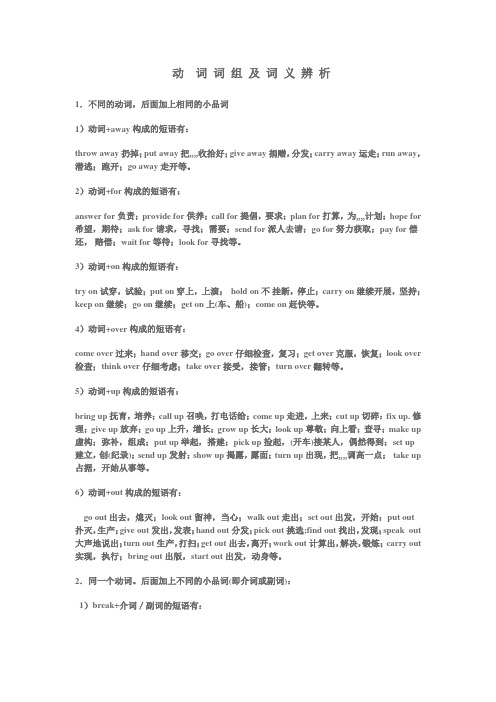
动词词组及词义辨析1.不同的动词,后面加上相同的小品词1)动词+away构成的短语有:throw away扔掉;put away把……收拾好;give away捐赠,分发;carry away运走;run away,潜逃;跑开;go away走开等。
2)动词+for构成的短语有:answer for负责;provide for供养;call for提倡,要求;plan for打算,为……计划;hope for 希望,期待;ask for请求,寻找;需要;send for派人去请;go for努力获取;pay for偿还,赔偿;wait for等待;look for寻找等。
3)动词+on构成的短语有:try on试穿,试验;put on穿上,上演;hold on不挂断,停止;carry on继续开展,坚持;keep on继续;go on继续;get on上(车、船);come on赶快等。
4)动词+over构成的短语有:come over过来;hand over移交;go over仔细检查,复习;get over克服,恢复;look over 检查;think over仔细考虑;take over接受,接管;turn over翻转等。
5)动词+up构成的短语有:bring up抚育,培养;call up召唤,打电话给;come up走进,上来;cut up切碎:fix up. 修理;give up放弃;go up上升,增长;grow up长大;look up尊敬;向上看;查寻;make up 虚构;弥补,组成;put up举起,搭建;pick up捡起,(开车)接某人,偶然得到;set up建立,创(纪录);send up发射;show up揭露,露面;turn up出现,把……调高一点;take up 占据,开始从事等。
6)动词+out构成的短语有:go out出去,熄灭;look out留神,当心;walk out走出;set out出发,开始:put out扑灭,生产;give out发出,发表;hand out分发;pick out挑选;find out找出,发现;speak out 大声地说出;turn out生产,打扫;get out出去,离开;work out计算出,解决,锻炼; carry out 实现,执行;bring out出版,start out出发,动身等。
常用动词辨析及常见多义词
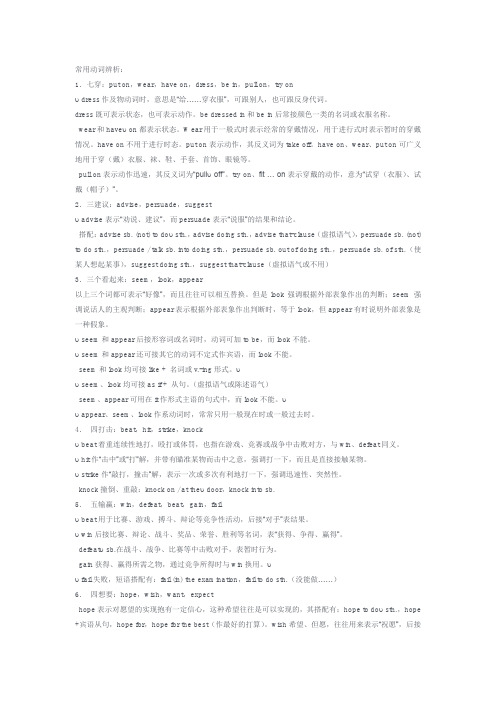
常用动词辨析:1.七穿:put on,wear,have on,dress,be in,pull on,try onυ dress作及物动词时,意思是“给……穿衣服”,可跟别人,也可跟反身代词。
dress既可表示状态,也可表示动作。
be dressed in和be in后常接颜色一类的名词或衣服名称。
wear和haveυ on都表示状态。
Wear用于一般式时表示经常的穿戴情况,用于进行式时表示暂时的穿戴情况。
have on不用于进行时态。
put on表示动作,其反义词为take off。
have on、wear、put on可广义地用于穿(戴)衣服、袜、鞋、手套、首饰、眼镜等。
pull on表示动作迅速,其反义词为“pullυoff”。
try on、fit … on表示穿戴的动作,意为“试穿(衣服)、试戴(帽子)”。
2.三建议:advise,persuade,suggestυ advise表示“劝说、建议”,而persuade表示“说服”的结果和结论。
搭配:advise sb. (not) to doυ sth.,advise doing sth.,advise that-clause(虚拟语气),persuade sb. (not) to do sth.,persuade / talk sb. into doing sth.,persuade sb. out of doing sth.,persuade sb. of sth.(使某人想起某事),suggest doing sth.,suggest that-clause(虚拟语气或不用)3.三个看起来:seem,look,appear以上三个词都可表示“好像”,而且往往可以相互替换。
但是look强调根据外部表象作出的判断;seem强调说话人的主观判断;appear表示根据外部表象作出判断时,等于look,但appear有时说明外部表象是一种假象。
(完整版)常用动词辨析
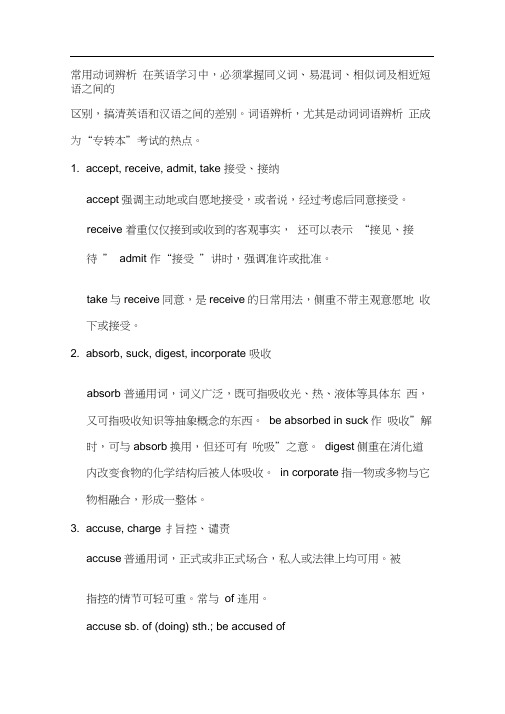
常用动词辨析在英语学习中,必须掌握同义词、易混词、相似词及相近短语之间的区别,搞清英语和汉语之间的差别。
词语辨析,尤其是动词词语辨析正成为“专转本”考试的热点。
1. accept, receive, admit, take 接受、接纳accept强调主动地或自愿地接受,或者说,经过考虑后同意接受。
receive 着重仅仅接到或收到的客观事实,还可以表示“接见、接待” admit 作“接受”讲时,强调准许或批准。
take与receive同意,是receive的日常用法,侧重不带主观意愿地收下或接受。
2. absorb, suck, digest, incorporate 吸收absorb 普通用词,词义广泛,既可指吸收光、热、液体等具体东西,又可指吸收知识等抽象概念的东西。
be absorbed in suck作吸收”解时,可与absorb换用,但还可有吮吸”之意。
digest侧重在消化道内改变食物的化学结构后被人体吸收。
in corporate指一物或多物与它物相融合,形成一整体。
3. accuse, charge扌旨控、谴责accuse普通用词,正式或非正式场合,私人或法律上均可用。
被指控的情节可轻可重。
常与of 连用。
accuse sb. of (doing) sth.; be accused ofcharge常与accuse换用,但charge多指较严重的错误或罪行,而且往往向法庭提出正式起诉。
charge sb. with (doing) sth.; be charged with4. acquire, obtain, gain, get, win, earn, secure 获得、取得、得到acquire 强调通过不断的、持续的努力而获得某物,也指日积月累地渐渐地获得。
书面语用词。
obtai n较正式用词,着重通过巨大努力、要求而得到所需或盼望已久的东西。
gain 侧重指经过努力或有意识行动而取得某种成就或获得某种利益或好处。
动词及动词短语辨析
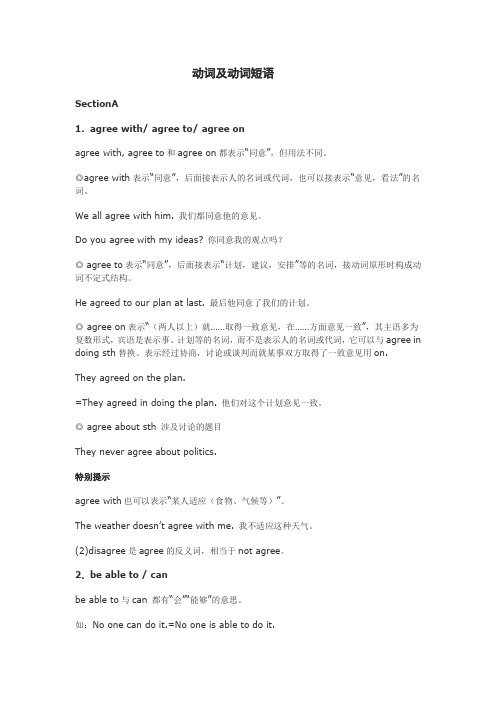
动词及动词短语SectionA1.agree with/ agree to/ agree onagree with, agree to和agree on都表示“同意”,但用法不同。
◎agree with表示“同意”,后面接表示人的名词或代词,也可以接表示“意见,看法”的名词。
We all agree with him. 我们都同意他的意见。
Do you agree with my ideas? 你同意我的观点吗?◎ agree to表示“同意”,后面接表示“计划,建议,安排”等的名词,接动词原形时构成动词不定式结构。
He agreed to our plan at last. 最后他同意了我们的计划。
◎ agree on表示“(两人以上)就……取得一致意见,在……方面意见一致”,其主语多为复数形式,宾语是表示事、计划等的名词,而不是表示人的名词或代词,它可以与agree in doing sth替换。
表示经过协商,讨论或谈判而就某事双方取得了一致意见用on.They agreed on the plan.=They agreed in doing the plan. 他们对这个计划意见一致。
◎ agree about sth 涉及讨论的题目They never agree about politics.特别提示agree with也可以表示“某人适应(食物、气候等)”。
The weather doesn’t agree with me. 我不适应这种天气。
(2)disagree是agree的反义词,相当于not agree。
2.be able to / canbe able to与can 都有“会”“能够”的意思。
如:No one can do it.=No one is able to do it.当表示现在或过去“能力所及”时,两者可通用。
I could /was able to run away fast when I was a boy.但两者用法也有区别:1. be able to 侧重强调能力,语气上要比can强一些。
英语十大动词介绍
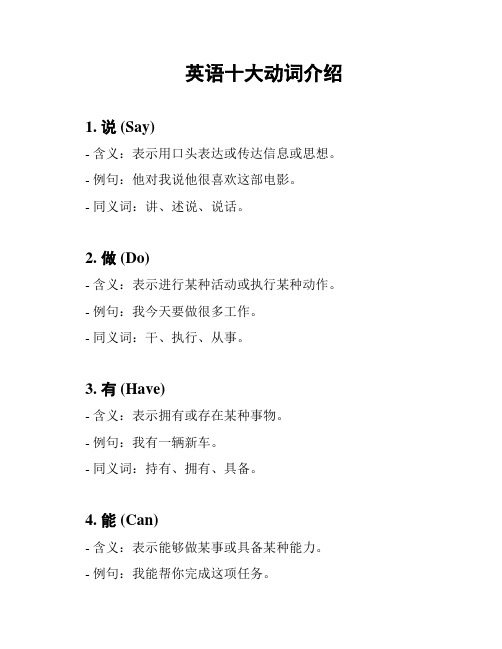
英语十大动词介绍1. 说 (Say)- 含义:表示用口头表达或传达信息或思想。
- 例句:他对我说他很喜欢这部电影。
- 同义词:讲、述说、说话。
2. 做 (Do)- 含义:表示进行某种活动或执行某种动作。
- 例句:我今天要做很多工作。
- 同义词:干、执行、从事。
3. 有 (Have)- 含义:表示拥有或存在某种事物。
- 例句:我有一辆新车。
- 同义词:持有、拥有、具备。
4. 能 (Can)- 含义:表示能够做某事或具备某种能力。
- 例句:我能帮你完成这项任务。
- 同义词:可以、有能力、会。
5. 去 (Go)- 含义:表示离开或移动到某个地方。
- 例句:我经常去公园散步。
- 同义词:走、去往、前往。
6. 得到 (Get)- 含义:表示获得或取得某种事物。
- 例句:他终于得到了他一直想要的工作。
- 同义词:取得、获得、收到。
7. 看 (See)- 含义:表示用眼睛观察或察看某物。
- 例句:我看到了一只小猫在花园里玩耍。
- 同义词:观看、望、瞧。
8. 知道 (Know)- 含义:表示了解或掌握某种信息。
- 例句:我知道今天是你的生日。
- 同义词:理解、认识、晓得。
9. 想 (Think)- 含义:表示思考或认为某事。
- 例句:我想明天会下雨。
- 同义词:思考、考虑、认为。
10. 爱 (Love)- 含义:表示深情地喜欢或在感情上关心某人或某物。
- 例句:我爱我的家人。
- 同义词:喜爱、热爱、钟爱。
以上是英语中的十个常用动词介绍。
这些动词在交流和写作中非常常见,对于研究和使用英语语言至关重要。
同时,通过合适的方式练和应用这些动词,可以提升英语表达的准确性和流畅度。
注意:以上解释仅供参考,语境和用法可能有所变化。
英语十大魔鬼动词词组

英语十大魔鬼动词词组英语十大魔鬼动词,为什么称这些词为魔鬼?就是因为这十个动词会衍生出许多非常相似的词组,在考试中经常出现很容易出错,平时多积累,考前多复习,好好记清楚。
Breakbreak away:突然离开、革除(习惯、信仰、思想方式)break away from:脱离……、离开、背叛break down:破坏、压倒、发生故障、失败、分解(化学反应)break in:闯入、打断(谈话等)、训练成为break into:闯入……、侵占、占用break off:折断、断绝、突然中断break off from:跟……断绝关系break out:发生、逃脱、爆发(战争)、发生(火灾、疾病、争吵、骚乱)break up:开垦、破坏、解散、结束、(指人)衰弱break with:与……绝交、放弃2.Bringbring about引起,发生,造成,导致bring back送回,使回忆,恢复(健康)bring down打落(飞机、鸟等),降低(物价、温度等),打倒bring in引进,收获,产生,介绍bring into being实现,使产生bring off送去,完成,办完,救出bring on引起,使成长,发展,前进,提出(论点)bring out显出,发表,说明,出版,产生bring over进口,说服,使转变(思想、信仰、事业等)bring round使……苏醒,恢复知觉,觉悟过来,转向(话题),说服bring to an end使终止,使停止,结束bring up语养育,教育,(旧事)重提,使停止,(船)到达终点comecome about发生,(风等)改变方向come across(偶然)发现、遇到come after跟在……后面,来找come along一道来,一起去,进步come around/round绕道而来,过访,(风向)改变,改变(主意)come at达到,接近,袭击come away脱开,离开,折断come back回来,复原,恢复come by从旁走过,获得come down倒下,降落,跌落,(病)倒come in进来,come into进入……得到,继承come into power上台执政,开始当权come into being(事物、局面等)形成,产生,成立,开始存在come into use开始使用,使用起来come on(演员)出台,(戏)上演,(问题)被提出,跟上来,(敌人)袭击come out出来,长出,传出,出版,解答出来,罢工,(污点)弄掉,显现come out with发表,公布,讲出,泄露come over过来,从远处来,传来,改变立场或意见,感觉到(头晕)come to总计,苏醒,复原come true实现,(预言等)成为事实,应验come up走近,上来,长出,流行,(太阳)出来,(问题)出现come up to到达,符合(标准),不辜负(期望)come up with赶上,提出getget along前进,进展,过活,友好相处get along with在……方面有进展,与……相处get away离开,逃脱,把……送走get back取回,回来,恢复get behind落后,识破,支持,深入get going出发,采取行动get/take/seize/catch hold of抓住,捉住,掌握get in进入,到达,收割,收集,当选get in a word插话get into进入,陷入(困境),从事于,习惯,变成get off送出送走,脱下(衣服),下车,出发,避开,免罚,起飞get on上(车,马等),进展,过活,接近,穿上,识破get on with在……方面有进展get out出去,离开,避开,泄露,取出发觉,出版get over越过,恢复,克服,完成,结束get round说服,逃避,克服(困难)get through到达(目的地),完成(工作任务),通过(议案),(考试)及格,(电话)接通,(钱)花光get to开始,到达,变成get together聚集,商谈,积累get down to sth./doing sth.开始认真干,认真着手进行get up起床,起立,产生,研究,安排get on with在……方面有进展get out出去,离开,避开,泄露,取出发觉,出版get over越过,恢复,克服,完成,结束get round说服,逃避,克服(困难)get through到达(目的地),完成(工作任务),通过(议案),(考试)及格,(电话)接通,(钱)花光get to开始,到达,变成get together聚集,商谈,积累get down to sth./doing sth.开始认真干,认真着手进行get up起床,起立,产生,研究,安排givegive away送掉,泄露,放弃,分配,出卖give back归还,送回,恢复,后退,报复give in屈服,让步,交上,提出,宣布give off放出,发出(气味、热等)give oneself up to牺牲自己,专心致志于give out发出,发表,发布,分发,(不用被动)用完、疲惫give over停止,放弃,交给give up让给,放弃,投降keepkeep away不接近,避开keep back留在后面,阻止,留下,隐瞒keep back one’s tears忍住眼泪keep down躺下,保留keep in mind记住,不忘keep in touch with和……保持联系keep off让开,驱散,防止,不接近keep time按时,守时keep up坚持,继续,保持,(斗志)不低落keep up with跟上,赶上,不落后于makebe made of用……(材料)制成be made from用……(原料)制成be made up of由……所组成be made into把……做成,使……转变成make out起草(文件),开(支票,清单等),理解,辨认make out of用……做,从……得出make up编造,赔偿make up for弥补,补上make up one’s mind下决心putput away把……收起来,储存……备用put back把……放回原处,妨碍,折回put down放下,镇压,记下,制止,(飞机)降落put in把……放进,提出,实行,度过(时间),(船)进港put into把……放进,插进,翻译成,(船)进港put off推迟,延期,阻止,劝阻,脱(衣服),出航put on穿上(衣,鞋等),增加(体种等),假装,拨快(钟表),推荐,安排,上演, put out放出,长出,熄灭,激怒,出版,生产,出发,启航put over放在……之上,推迟,延期,做成,被人接受put up举起,打开,挂起(旗),进行,提名,搭起,提高,上演,陈列,供给食宿,张贴setset about(sth./doing sth.)开始、着手(工作)set an example to sb.给……树立榜样set back拨回(钟表),使退步,阻碍set down放下,记下,卸下,制定set fire to sth.放火焚烧,引火烧set foot on踏上……,登上……set free释放set……going运转,开动,推动set off出发,动身,放(火箭、炮)set one’s heart/mind on/upon专心致志于,渴望,热心set out出发,开始,陈列,陈述,打算set sth.on fire放火焚烧,引火烧set…….-ing/to do使……做set up竖起,建立,开办,贴出,提出(意见),使精神振奋taketake away拿走,取走,减去take back收回,取消,撤消take down拿下,取下,拆毁,记录下来take in收进,接受,收容,理解,留宿take it easy别紧张take off拿掉,移送,免除,脱去(依、帽、鞋等)take out取出,除去,摘录(要点)take over接收,接办,接任take part in参加take an active part in积极参加take place发生take the place of/take one’s place代替take the part of支持take up拿起,开始,从事,汲取,接纳(乘客),接受,占(时间、空间、注意力),学习(学科),继续take up with和……交往,忍受,采用throwthrow at向……投掷throw about乱丢(东西),乱花(钱)throw away抛弃,浪费,错过(机会)throw back丢回,拒绝,反驳,使想起,使恢复原状throw down推倒,推翻,拆毁,使沉淀throw in扔进,插话,(免费)附送throw into陷入(某种状态),投身于throw off抛弃,摆脱throw up呕吐(参考英语好教师整理)。
英语动词词汇用法辨析
英语动词词汇用法辨析动词是英语句子中最常用和最重要的词类之一。
正确使用动词是理解和运用英语的关键。
本文将对一些常见的英语动词进行辨析,帮助读者更好地理解和运用这些动词。
1. Say 和 TellSay和Tell都可以表示“说”,但它们在用法上有所不同。
Say常用于直接引述,而Tell则用于传达信息。
例如:- She said, "I love you."- She told me that she loved me.2. Do 和 MakeDo和Make都可以表示“做”,但它们在用法上有所不同。
Do通常用于表示日常活动或任务,而Make则指制作或创造某物。
例如:- I have to do my homework.- She makes beautiful handicrafts.3. See,Look和WatchSee,Look和Watch都可以表示“看”,但它们在用法上有所不同。
See强调“看到”,Look着重于目光集中在某处,Watch则表示有意地观察。
例如:- I saw a movie last night.- Look at that beautiful sunset!- Let's watch a soccer game tonight.4. Go,Come和GetGo,Come和Get都可以表示“去”,但它们在用法上有所不同。
Go 指从说话者所在的地方离开,Come指朝说话者所在的地方靠近,Get 则强调到达某个地点。
例如:- I will go to the park tomorrow.- Please come to my house for dinner.- Let's get to the airport early.5. Take,Bring和FetchTake,Bring和Fetch都可以表示“拿”,但它们在用法上有所不同。
Take表示从说话者所在的地方带走,Bring表示朝说话者所在的地方拿来,Fetch则表示去某处拿来。
高考英语常考的十大动词词组,京航教育老师直言一定要掌握
十大动词搭配1.Catchcatch a cold感冒;受凉catch fire着火;变得流行,火起来catch hold of抓住catch on流行;领会catch on to理解catch one’s breath喘气;休息catch one’s eye/attention引人注目/引起注意catch sight of看见catch up with赶上ecome along过来;进展,发展come along with随同come across偶尔遇见,偶尔发现come at袭击;拜见come by从旁走过come around到来/苏醒,恢复/改变看法或立场come around/round to赞成;同意come back回来/想起,记起come by获得,得到;拜访,串门come between离间,使分开,使产生隔阂come down with因……而病倒;患…病come down流传come to the point抓住要点come into contact with与……接触come in for遭到,受到(责备等)come on发生,赶快come off发生,举行come off it别傻了,别闹笑话了,别出洋相了come out发行;被告知;结果是;公开宣称come into operation启用come to a standstill停止come to a stop停止;到站come to an end结束come to light真相大白;显露come true梦想成真come through按要求(或期望)做:come up to达到;符合;不辜负(live up to)come up with提出;赶上come upon偶然发现(或遇见)come a long way取得进展;明显提高come all the way远道而来;大老远跑来come in handy迟早有用come into being诞生,形成come out of从(某场所)出来;出自come to one’s mind想起come to think of it回头想起come to an agreement达成协议come what may无论如何3.Dodo a favor帮忙do good to有益于do harm to有害于do damage使受到损失do(one)in使精疲力竭;杀死do(one)out of骗取do away with废除;去掉do(one’s)own thing做自己最喜欢(最擅长的事)的事do or die需要拼命,需要全力以赴do over重做,返工;重新装饰(或装修)do one’s best竭尽全力4.Getget across穿过;清楚表达;使理解get accustomed to=get used to习惯于get along进展;相处;度日get at暗示;够得着,触及;get away with逃脱get bored doing厌倦做某事get by(勉强)对付过去,(勉强)过活;溜走;勉强过得去get down to开始处理;开始认真对待get down使难过get hurt受伤get one’s hopes up使某人产生希望get even with扯平get going开始get hold of掌握;了解get in the way挡道get in进入,被允许进入;到达get in touch with与……建立联系get somewhere/nowhere有(无)进展get off the ground有所进展;突破get off被允许离开;逃脱惩罚,逃避义务;get on one’s nerves使……心烦get on和睦相处;变老;继续,继续进行,进步;5.Gogo about流传;开始做(复杂的事);继续go after追求;追逐go along配合go around足够供应,谣言流传;四处走动go beyond超出;胜过go back on违背(诺言等)go by凭……判断;顺便拜访go down下降;下跌;消肿;被记住(铭记)go Dutch各付个的;AA制go in(into)详细调查;从事go in for赞成;参加(考试);热衷于go off消失;变质;爆炸,发出响声go off on me对我发脾气go on with=go ahead继续go out出去;泄密;过时;停止运转,熄灭;约会go out of one’s way to do sth.不辞辛苦做...go over参观;复习;仔细检查;被接受(得到赞许);go through通过;经历;完成go through with把…进行到底,完成,实现go steady(和某人)正式确定恋爱关系go up上升;增长;上涨go under倒闭,失败,垮掉go all out全力以赴;竭尽全力go out of business歇业;停业go without saying不用说,不言而喻on the go忙个不停的go through a lot of money花了很多钱6.Keepkeep an eye on sth.照看;密切注视keep in mind记住keep in touch with与……保持联系keep pace with与……同步前进keep off避开keep back隐瞒(信息),拒不告诉;保留,储存for keeps永久地keep on(doing)继续(做某事)keep one’s finger crossed祝……好运keep(one’s)eyes open or peeled密切注视keep(one’s)head above water(通过持续努力)生存,继续;勉强对付keep track of追踪;知道;理解keep(one’s)sanity保持镇静keep up with跟上;继续keep up one’s spirits振作精神keep cool保持冷静keep count on保持联系keep sth.in mind把……记在心上keep sb.from doing sth阻止某人做某事keep(sth.)to oneself不与人交往;保守某事keep one’s opinion/idea to oneself不把想法告诉别人7.Makemake a fuss大惊小怪;小题大做make advances取得进展make war发动战争make an effort努力make a night of it痛快的玩一晚make a day of it做了一整天make a living谋生make a comeback东山再起make a face扮鬼脸make away with拿走,偷走make a point of坚持要make believe假装,假扮make certain肯定;确认make do凑合,将就make ends meet收支平衡make friends交朋友make for有利于,有助于make it成功make light of认为…不重要make much of重视make the deadline赶上最后期限make a fortune=make big bucks挣大钱make no difference毫无区别make a difference有影响,有关系make out辨认出;理解;填写make off with(迅速)拿走,偷走8.Putput an end to=put a stop to终止put aside撇开put across沟通,交流,被理解put away把……放回原处;收起来put by留存,积蓄put down把……记下来;镇压;贬低,看不起;put forward提出put off延期put into practice实践put on穿上;上演put sth.in order把……弄整齐put to use使用put up举起;安顿;参与;建立put up with容忍;忍受put up to(doing)怂恿,唆使put out熄灭;解雇;给…添麻烦,冒犯put out with对某人生气put out by由于某事而生气put through to电话接通put over on欺骗,愚弄9.Taketake action采取行动take advantage of利用take after仿效;(相貌、脾气或性格)与…相似,像take care of照顾take effect生效take(sb.)for a ride欺骗,蒙骗(某人)take charge of负责;管理take in接待;减小,改小;理解,明白;欺骗take into account=take account of把……考虑进去take into consideration考虑到take it easy不要紧张;慢慢来take it for granted把……当成理所当然take measures=take steps采取措施;步骤take off起飞take one’s time doing sth.从容不迫做某事take over接管;接收have what it takes有能力,能够take part in参加take potshots at拐弯抹角地批评,指桑骂槐take place代替;发生,出现take out sth.on sb.向某人出气take turns轮流take up占有;着手take a break休息,放松take a close look仔细看一看10.Turnturn around转身at every turn到处,时时in turn轮流地→(反义)out of turnturn down关小;拒绝turn in=hand in上交turn into把……变成turn off关闭turn away把(某人)打发走turn blue/green冻得青紫/羡慕,嫉妒turn on打开turn over移交;再三考虑;翻转turn over a new leaf改变,(尤指)改过自新turn to翻到;转向;求助于turn(one’s)stomach使恶心;使作呕turn up突然发现;找到;出现turn up(one’s)nose拒绝turn out结果是;培养;生产;打扮。
初中英语常见动词辨析
初中英语常见动词辨析
初中英语中,同一个意思可能会有多个动词来表达,让人们很容易混淆。
下面是一些常见的动词辨析,帮助你更好地理解它们的不同之处。
1. look, watch和see
- look: 注意性强, 强调看的方向或姿势,可以意味着随便或仔细看。
- watch: 强调持续观察,通常与某个事件或人有关。
- see: 看到某东西,并意识到它的存在。
2. talk, speak和say
- talk: 指有意交谈或交流。
- speak: 更加正式和庄重的说话,强调说话人的能力或身份。
- say: 强调说话的内容。
3. give和take
- give: 表达主动性,释放或传递给别人。
- take: 表达被动性,获取或接受。
4. buy和purchase
- buy: 常用词,一般指购买任何物品。
- purchase: 更正式的词,指购买高价值物品或商业用品。
5. like和love
- like: 喜欢,表示对某事感兴趣,或者想去做某事。
- love: 爱,表示对某人或某事的深情。
请记住,最好的研究方法是通过实践来掌握这些词汇的正确用法。
希望这些动词辨析可以帮助您在研究英语中更加自信地表达自己!。
高中英语动词短语辨析
第一版本:易混动词短语辨析1. die off= die away消失(离远去)die down 声音逐渐变弱,变小2.go out 1)出去;2)出去参加社交活动;3)灯熄灭(go out = be out)set out 1)出发;2)开始come out 1)得出;2)开花、发芽;3)出版work out 1)计算出;做出;制定出;2)出去锻炼;3. take up 开始从事职业、职务take over接管take on 1)呈现(色彩,面貌);2)雇佣;3)承担take off 1)脱下,取下;2)事业起步,飞机起飞4.Pick up 1)偶然学到;2)开车去接;3)局面好转Pick out 辨认出5. hand out=give out=share out=distribute 分发result in=lead to=bring about导致6. cut off 1)切断(水,电)的供应;2)断绝关系、联系cut up 1)切成小块,砍碎;2)连根拔起cut down 1)切成块;2)减少7.Run smooth 进展顺利(不用smoothly)Go smoothlye off =fall=drop花凋落Keep off 远离,不靠近Leave off= stop停止Set off 1)放烟花;2)使爆炸9.make up 补足;化妆;编造Make up for弥补10.put up with=come to terms of忍受Keep up with=catch up with跟上;赶上in terms of就….而言,关于…..;涉及…..11.go through 1)=live through经历,渡过;2)=look through仔细检查;3)通过get through 1)接通get through to sb;2)完成,读完书,写完东西3)通过12.set up树立;创立Put up挂起;张贴Send up使上升13.put away收好、放好Take away脱下、放下外在的东西14.bring back使想起bring about产生Vtbring up 1)培养;2)吐出come about产生Vi15.call on 1)访问;2)号召Call for 1)需要;2)号召16.send up 1)发射(satellite, rocket, signal )2)把…..关入监狱send sb up=send sb into prisonSign up for报名参加,注册Try out for参加17. call up 1)召唤;2)使想起=bring back3)调动(人员、力量);4)提出(议案)=come up4)给….打电话18.at ease 平静、宁静With ease轻松地do sth with easeease v.缓解unease焦躁,不安的19.go about开始做、着手于get about=get around到处走动20.do away with=call off=cancel=abolish取消,废除(规定、制度)Break away from脱离21.give out 1)发出尖叫;2)耗尽、用完;=run out;3)分发、分配give off发出烟、气味smell/smokelet out 1)让…出去;2)泄露put up 1)张贴put up the notice;2)举起break into 1)破门而入;2)大的变小22. by the way顺便说In the way挡住….的去路on the way在去…的路上23. provide for sb=support sb供养provide for sth为可能发生的事情做好准备24.at a time一次、每次at no time= in no way= by no means= on no account绝不in no time= at once= in a moment = right away 立刻、马上at a time一度、曾经25. call for 1)要求、需求;2)约某人、去叫某人;3)号召call on 1)拜访call on sb; call at sp;2)号召call in调集call in the police,call in the army26.for the moment当时、在那个时候for a moment一会儿at a moment当时、这时(at present)in a moment= right away= in no time立刻,马上right now= just now刚才27.put off=delay推迟put up 1)举起;2)张贴;3)忍受put up withput away 1)收起、收好;2)存钱28.go away走开、离开;拿走、带走go off出发;爆炸;铃响;go off to Japango out出去;灯熄灭run out (物品、钱)用完give out(力气、耐心)用完、耗尽29. refer to= deal with= cover涉及set down= put down=write down写下shut down= cut off关闭;与外界隔离30. give sb a ride= give sb a lift给某人搭顺风车take hold of抓住give away= donate 捐赠31. hold back阻止hold on 1)别挂断;2)别松开、别松手;3)拥有、占有、保存有hold up 1)被(雨、交通)困住;be held up= be stuck with2)举起、支撑起、顶起32. go about 1)=set about开始做、着手于;2)=deal with处理3)wander about四处走动33.get there=make it成功get across传达、让….清楚;明白get along进展,和….相处get in 1)收割get in the crops;2)插话get into 1)进入…里面get into trouble;2)上车get into the car/ get out of the carget off 下车get off the bus/ get on the busget through 1)接通;2)完成;3)穿过get up 1)站起来;2)起床34.give away 1)捐赠,赠送;2)泄露、透露(无意)=let out (有意或无意)give back归还give in to sth屈服,让一步give out 1)分发=hand out= distribute2)(体力、精力)耗完,耗光give up放弃35.stick out突出、伸出36.call up 1)唤起;2)给…打电话call for 1)要求= require;2)约某人、哈某人call on 1)看望、拜访;2)掉军队;3)号召call in 调军队、叫警察call off 取消37. bring in 引进;带来bring up 1)抚养be brought up;2)呕吐bring out 1)将….拿出来;2)将….阐述清楚bring about 1)使产生、使出现;2)造就bring about the best charater of sb 38. put forward提出Put on 1)穿上;2)表演Put up with=bear= stand忍受39.think over仔细考虑Think of/ about想起Think up想起、提出40.be close to= get close to 1)接近、靠近;2)快要、将要be/get close to sbe up用完、用光VtGive out=run out Vi42.hand over将….交给某人43.add to增加add up to总共是44. go over复习、预习、过一遍go through浏览、仔细地看e around出来;到来come along走上来come out出版;生产;扑灭;关掉give rise to= bring about= result in= lead to带来;产生;导致46.pay off 1)得到回报(Vi,不及物,没有被动语态)hard work + pays off+will pay off2)还清债务(Vt)His debt has been paid off.set off 1)引爆烟花set off the fireworks2)引来激烈讨论3)引来波动give off 发出光、热、气味give out(Vi)耗尽、用完(力气、体力)run out(Vi)耗尽、用完(物品、钱)47.turn around转身turn over翻身48.put forward= come up with提出49.may as well做….也行may well完全可以、很有理由50.take in 1)接收活干;2)接收、吸收;3)被欺骗take up 1)占据;2)开始从事take on 1)承担;2)雇佣;3)呈现51.open up 1)引发=set off;2)提供;3)开采、开发52.fall over 摔倒、被….绊倒jump over跳越turn over翻转53.keep up 1)维持、保持;2)持续close up 1)商店短时间的关门;2)对…避而不谈close down 1)工厂、商店倒闭、关闭;2)电台停止播报节目shut down(工厂)倒闭shut up闭嘴54. add up to 1)总共;2)意味着add to增加55.round up= drive sth/sb together使聚拢56.think out仔细考虑然后做出计划think up想出57.bring sth out把….带到外面take out拿出来carry out贯彻、执行turn out 后来证明;生产58.turn on打开(电源)go on发展、发生act on作用于59.give out 1)发出气味等;2)力气耗尽give off发出光亮60.break free挣脱、获得心灵的、精神的解放break out战争、争吵、火灾等爆发break down 1)(车辆)抛锚;2)谈判破裂;3)身体跨掉;4)塑料降解break up破裂、关系中断break off停止说话、突然中断break in闯入;打断(说话)61.stick to坚持…观点stick with支持62.draw up 1)起草、草拟;2)车停下63.cover up掩盖、掩饰roll up关闭64.make out 弄懂、理解hold out 1)持续、维持;2)在困境中获胜come out 1)书出版;2)花开;种子萌发send out 发出(光、热、气味)pick out 1)挑选;2)认出来;3)凭记忆慢慢地演奏hold up 1)举起、支撑;2)塞车65.apply to 1)适用于apply A to B;2)申请apply to sb for sthapply for sth申请66.die down火势减小die away 1)离开、远去(身影、影子);2)(声音)愈来愈小67.give out 1)分发;2)力气用完give off 发出光亮、气味第二版本:1. 以break为中心的词组break away from 脱离,逃离break down 破坏,粉碎;瓦解;出故障,抛锚break in 闯进,打断;使顺服break into 闯入;强行进入;突然开始break out 爆发,发生;准备使用;起锚break the law 违反法律break the record 破记录break one’s promise 失言break up 开垦,破碎;解散,分开,分解2. 以catch为中心的词组be caught doing 被发现做某事be caught in the rain 淋雨catch a bus/train 赶汽车/火车catch a cold 伤风,感冒catch one’s word 听懂某人的话catch sight of 发现,瞥见catch up with 赶上,追及,追上3. 以come为中心的词组come across 偶尔发现,想起;越过;偿付come along 一道来,陪伴;进步,进展;出现come at 达到,求得,得到;扑向,袭击come back 回来;恢复,复原come down 倒下;降落;跌落;病倒come from 来自,起源于,从~~产生,生于come in 进来,进入;流行起来;获名次come into being 发生,产生,出现,形成come into power 开始执政,当权,当选come into use 开始使用,获得应用come on 上演;开始;赶快;发展;登台;(问题)被提出come out 出来,传出;出版;结果是;褪色;(秘密)泄露come to 苏醒,复原;共计;达到;归结于come to an end 终止,结束come to know 开始了解到come true 实现,成为现实;证实come up 走近;上楼;长出,发芽4. 以do为中心的词组be done in 精疲力竭be done with 完全结束do a good deed 做一件好事do away with 去掉,废除;弄死;浪费do good to (=do sb. good) 有益于do harm to (=do sb. good) 有害于do its work 有效,有作用do much 极有用do wrong to 做错do one’s best 尽某人最大努力do one’s homework 做作业do one’s utmost 尽力而为do proud 足以使~~骄傲do sb. justice 公平对待某人do some cleaning (V+ing,etc.) 搞卫生do sb. a favor 帮助某人do well in 学得不错,干得漂亮do with 和~~相处,忍受,处理do without 不需要,不用do wonders 创造奇迹have much to do with 和~~很有关系have nothing to do with 与~~无关have something to do with 和~~有关in doing so=in so doing 这时,在这种情况下That will do. 行了;够了5. 以get为中心的词组get about 徘徊,走动,旅行;流传get above oneself 自视高傲get accustomed to 习惯于,对~~习以为常get across 度过,通过,横过;说服,使理解get ahead of 胜过,超过get along 前进,进步;同意;离去get along with 与~~相处get at 发现,了解;掌握;攻击get away 离开,逃脱get back 取回,回来;报复get behind 落后;识破get down 咽下;写下;使沮丧,使抑郁get down to 认真对待,静下心来get familiar with 熟悉get hold of 获得,取得get home 到家get in 进入,陷入;牵涉get off 送走;脱下(衣服);下车;动身get on 上车;穿上;进步,使前进;成功;相处get upon with 进步;在~~方面获得成功get one’s hand in 熟悉;习惯get out of 由~~出来,从~~得出;避免;退休get over 越过;恢复,痊愈;克服;完成get ready for 为~~作准备get rid of 除去,去掉;免除,摆脱get through 到达,完成,通过;及格get together 积聚,积累;商谈,取得一致意见get up 起床,起立;研究,钻研;致力于;安排,组织get used to 习惯于have got to do 不得不,必须6. 以give为中心的词组be given to 沉溺于,癖好give about 分配;传播give and take 相互迁就give away 赠送;牺牲;泄露;颁发give back 归还give cause 给予~~的理由give ear to 侧耳倾听give forth 发出,放出;发表give in 屈服,让步,投降give in to 同意,接受;向~~让步give off 发出(烟,气味)give oneself out to be/as 自称为give oneself up to 专心于;向~~自首give out 分发,公布give place to 让位于,被~~所替代give rise to 引起,导致;使~~发生give sb. to understand 通知某人give up 放弃;停止give way to 让步,退却;屈服于7. 以look为中心的词组look about 四下环顾;查看look after 照顾,看管look around 东张西望look at 注视,着眼于look back 回顾look for 寻找;期待,期望look down on 俯视;轻视look forward to 盼望,期待look into 窥视;调查;浏览look like 看起来象look on 旁观;面向look out 向外看;注意;当心,堤防look over 从上面看过去;检查look through 透过~~看去;看穿;浏览look up to 仰望,尊敬8. 以make为中心的词组be made from 由~~原料制成be made of 由~~材料制成be made up of 由~~组成make a fool of 愚弄,欺骗make a mistake 弄错make a point of doing 强调;认为~~重要;决心,坚持make advantages/use of 使用,利用make after 追求,追赶make believe 假装make certain 确信,把~~弄清楚make contact with 接通,与~~接触,与~~联系make for 去向,向~~前进;有利于make friends with 和~~交友make into 把~~制成,使~~转变为make much of 重视;理解;赏识make one’s mind on sth. 决定某事make one’s own 当作自己的看待make oneself at home 随便,别拘束make out 填写;开支票;理解;辨认make the best of 尽量利用;极为重视make up 弥补,修理;赔偿,补偿;起草;编造;化装make up to 接近,巴结;向~~求爱make way for 为~~让路,让路于on the make 急求成功;增加9. 以put为中心的词组put aside 把~~放在一边;搁置;排除put away 把~~放好,把~~收拾;储藏;吃喝,吃掉put back 把~~放回原处;驳回put down 放下;镇压;制止;记下;削减;降落put forward 提出;拨快;建议,推荐;提倡,倡议put ~~ into 把~~放入;插入;翻译成put off 推迟,延期;消除;推脱,推辞put on 上演;穿上,带上put one’s heart into 全神贯注,专心致志put up 举起,挂起;提名,推荐;陈列put up with 忍受,容忍10. 以take为中心的词组be taken aback 吃惊take a seat 就坐take a shower 淋浴,洗澡take aim 瞄准,设立目标take away 拿走,减去;夺去take ~~ by surprise 出奇制胜take care of 当心,注意;照顾;提防;谨慎;处理,对付;负责take ~~ for 把~~当作take off 脱去,除去;离开;起飞;模仿;起程;致死;复制,作副本;减弱take office 就职,上任take one’s place 就坐,入坐take one’s temperature 量体温take part in 参与,参加take place = happen 发生,举行take the place of 代替take pride in 以~~为荣,对~~骄傲take sb. by the arm 拉某人的胳膊take it easy 别着急,慢慢来11. 以turn为中心的词组give a new turn to 对~~予以新的看法in one’s turn 轮到某人做某事out of turn 不按次序的,不合适宜的take one’s turn to do 轮到做turn a blind eye to 对~~视而不见turn against 背叛,采取敌对态度turn back 折回,往回走turn down 折叠,翻下,驳回,拒绝考虑turn into 走进;变成,变为turn to ~~for help 求助于turn off 关上(自来水,电器开关);解雇,辞退;避开(问题);制造;生产turn on 打开(自来水,电器开关);反对;依靠,依赖,取决于turn one’s attention to 把注意力转向turn out 培养;证明是;制成;实际情况是turn out to be 原来是,证明是,结果是turn over a new leaf 翻开新的一页,重新开始,改过自新turn (a)round 旋转,转过身来;改变意见;采取新政策turn to 变成;着手于turn upside down 颠倒过来,翻过来;使陷入混乱。
- 1、下载文档前请自行甄别文档内容的完整性,平台不提供额外的编辑、内容补充、找答案等附加服务。
- 2、"仅部分预览"的文档,不可在线预览部分如存在完整性等问题,可反馈申请退款(可完整预览的文档不适用该条件!)。
- 3、如文档侵犯您的权益,请联系客服反馈,我们会尽快为您处理(人工客服工作时间:9:00-18:30)。
十大动词词组辨析一、give 词组1. In those days, he used to give _____ a part of his income to help his friend.2. Both sides argued with reason, and neither would give _____.3. If they are burned, they give _____ poisonous gases.4. When they made ready to climb the next ridge(山脊),they found that their oxygen had given ______.5. Both the man and horse gave _____ after the long ride.6. All hope of finding the missing aircraft was given _____ and the search stopped.7. Mary had to give _____ her job after her marriage.8. 举行音乐会9. 演讲,做报告10. 给...上课11. 给某人关于... 的忠告Answers:1. give away 赠送,给予2. give in 投降,让步,屈服3. give off 发出,放出4. give out 用完,耗尽5. give out 力竭6. give up 放弃7. give up 辞去8. give a concert9. give a talk10. give lessons to11. give sb. some advice on ...二、go 词组1. Please don't go _____ _____ it till you've seen me again.2. He has been in this class only a few weeks and he is already going _____.3. Many years have gone _____ since we first met.4. The parade (游行)went _____ us.5. The crocodile went _____ under the water.6. Let's go _____ by the lift(elevator).7. The war went _____ until 1918.8. If you never read the newspapers, you'll never know what's going ______in the world.9. After he had given an account (说明)of the difficulties he went _____to suggest ways of overcoming them.10. They went _____ _____ their open-air performance in spite of the rain.11. Put more wood on the fire, otherwise it will go _____.12. The mechanic(技师)went _____ the engine but found nothing wrong.13. They went _____ their lessons together at night.14. The bullet(子弹)went _____ the wall.15. The police went _____ very room of the building.16. 去钓鱼17. 去买东西18. 去游泳19. 回家20. 出去散步21. 入睡22. 全力以赴23. 上大学24. 去医院25. 上学26. 上床睡觉27. 去电影院看电影Answers:1. go ahead with 继续进行,推进,前进2. go ahead 取得进展3. go by 时间过去4. go by 经过5. go down 下去,下沉6. go down 下去7.go on 继续8. go on 发生,进行9. go on 继续10. go on with 继续11. go out 灯,火熄灭12. go over 检查13. go over 复习14. go through 穿过,通过15. go through 仔细检查,查看16. go fishing17. go shopping18. go swimming19. go home20. go out for a walk21. go to sleep22. go all out23. go to college24. go to hospital25. go to school26. go to bed27. go to the cinema三、look 词组1. The boy is old enough to look _____ himself.2. He spent two weeks in Shanghai, looking _____ the city.3. We are looking _____ _____ hearing from you soon.4. Join us. Don't just look _____.5. They all looked _____ him _____ a member of their family.6. Look _____! There is danger ahead.7. I shall look _____ that I don't trust him again.8. He looked _____ his notes before writing the report.9. Look _____ these photographs and try to pick out the man you see.10. I must look _____ the time of your train.11. A fox came to the tree and looked _____ at the cock.Answers:1. look after 照顾,照料2. look around/about 四处看看,四下环顾3. look forward to 盼望,期待4. look on 旁观,观望5. look on ... as ... 把...看作...6. look out 当心,小心,留神7. look out 警惕8. look through 浏览,翻阅,温习9. look through 仔细查看10. look up 查寻,查阅11. look up 仰视四、make 词组1. Bamboo is also made _____ paper.2. Our desks and chairs are made _____ wood.3. The paper for books and newspapers also is made _____ wood.4. This engine is made _____ _____ 490 parts.5. The actor made himself _____ for the part of an old man.6. These days many girls make _____ when they are still quite young.7. She made _____ a good lunch from bits and pieces.8. There isn't any little girl called Kitty here. He has just made her _____.9. Hard work can often make _____ for lack of intelligence.10. Everyone should make _____ _____ _____ time.11. But wait till you see what we'll make for you _____ your own measure.12. I have made _____ _____ _____, and nothing you say will change it.13. They made _____ _____ my mistakes when I tried to speak English. Answers:1. make into 制成,作成(后面跟产品,制成品)2. be made of 用某种原材料制成(后面跟原材料)3. be made from 用某种原材料制成(后面跟原材料)4. be made up of 由...组成,由...构成5. make up 化妆6. make up 化妆,打扮7. make up 配制8. make up 编造,虚构9. make up for 弥补,补充,补偿10. make full use of 充分利用11.make to one's own measure 照某人的尺寸去做12. make up my mind 下决心13. make fun of 取笑,嘲笑,和...开玩笑五、put 词组1. We put _____ the tools before we leave the workshop.2. All the medical workers in the region helped to put _____ the influenza epidemic(流感).3. Never put _____ until tomorrow what you can do today.4. We are putting the play _____ again next week owing to(由于)its success.5. The fire man soon put the fire _____.6. The doctor told me to put _____ my tongue.7. It's time that we put _____ the Christmas decorations(装饰物)in the living room.8. Drop your weapons and put your hands _____.9. Another supermarket has been put _____ near our house.10. I can't put _____ _____ a lot of noisy people when I am working.11. 使进入,输入12. 全神贯注于...之中Answers:1. put away 放好,受起来2. put down 扑灭,平息,镇压3. put off 延期,拖延4. put on 上演,穿戴5. put out 熄灭,扑灭,使...停止燃烧6. put out 伸出,拿出7. put up 挂起,张贴8. put up 举起,抬起9. put up 建造,搭起10. put up with 忍受,容忍11. put into12. put one's heart into12. keep up with 跟上13. keep watch 守望,值班,放哨六、set 词组1. As soon as she arrived, she set _____ tidying up (整理,收拾)the room.2. They've set _____ on a trip round the world.3. Together the four men set _____ to look for the lost animal.4. He set _____ to write a history of civilization(文明).5. We'll certainly set_____ a complete modern industrial system.6. A few scarecrows(稻草人)were set _____ in the field.7. Let's set _____ the tent first, and build the fire later.8. 放火9. 释放某人10. 给某人树立榜样Answers:1. set about doing 着手,开始2. set off 起程,出发3. set out 出发,动身4. set out to do 开始,着手5. set up 创立,设立,建立6. set up 竖起,支起7. set up 竖起,支起8. set fire9. set sb. free10. set an example to sb.七、turn 词组1. Those who were once for him have turned _____ him.2. Turn _____ everything captured(缴获的).3. I'm going to turn my garage _____ a playroom for the children.4. Be sure to turn _____ the lights when you leave the room.5. Shall I turn _____ the bath water for you?6. He turned the meat _____ in the pan(平底锅).7. They always turn _____ me when they are in trouble.8. His attention turned _____ the pretty young girl.9. Turn the radio _____ a little. I can scarcely hear the program.10. He turned the coat collar(衣领)_____ because of the wind.11. Something will turn _____ to get you out of the difficulty.Answers:1. turn against 转而反对2. turn in 交进,上缴,归还3. turn...into... 变成,转变成4. turn off 关掉灯,气,水,电器等5. turn on 打开6. turn over 把...翻过来7. turn to 转向,找...求助8. turn to 转向9. turn up 把音量开大一些10. turn up 卷起,翻起,11. turn up 发生,出现八、take 词组1. Mr. Pier has taken his son _____ from the boarding-school(寄宿学校).2. The baby was playing with a needle, so I took it _____ from her.3. He would neither apologize nor take _____ what he had said.4. I took the book _____ to the library yesterday.5. The rain has stopped. You may take _____ your umbrella.6. The motorist's name and address were taken _____ by the policeman.7. He took _____ his glasses and wiped them again, outside and in.8. The crew(全体船员,乘员)of the tanker were taken _____ by helicopter (直升飞机).9. A helicopter is able to take _____ and land straight up and down.10. The dentist is going to take this tooth _____.11. The weather is perfect for taking the children _____ for a walk.12. The accident took _____ only a block from his room.13. The concert takes _____ next Friday.14. He has taken _____ photography as a hobby.15. Music takes _____ more than thirty percent of the broadcasting programmers.16. The wardrobe(衣柜)took _____ too much room.17. 看一看18.给某人捎个信19.坐下20.瞄准21.积极参加22.照顾,保管23.不辞劳苦地做某事24.握住,抓住25.别着急, 别紧张26.呈现新面貌27.坐某人的座位,代替某人的职务28.给某人量体温29.依次,轮流30.拍照31.以...自豪32.错拿某物,错认某人33.认为当然34.代替35.支持36.坐这个座位Answers:1. take away 带走2. take away 拿走3. take back 收回,带回4. take back 带回,送回5. take down 拿下6. take down 记下7. take off 拿下,脱掉8. take off 救起,营救9. take off 起飞10. take out 取出11. take out 带某人出去12. take place 发生13. take place 举行,举办14. take up 从事某项活动,发展某种爱好15. take up 占去时间16. take up 占去地方17.take a look at18. take a message for sb.19. take a seat20. take aim21. take an active part in22. take care of23. take great trouble to do sth.24. take hold of25. take it easy26. take on a new look27. take one's place28. take one's temperature29. take one's turn30. take photos31. take pride in32. take sb./sth. by mistake33. take sth. for granted34. take the place of35. take the side of36. take this seat九、have 词组1. Class is over. let's have _____ _____ (休息一下).2. I've got _____ _____(咳嗽).3. Dad and I had _____ _____ _____ _____ (对...笑了一个够)that.4. They are having _____ _____ _____(玩得高兴).5. He stopped to have _____ _____(看了一看).6. We are going to have _____ ______ _____ ______(举行一场乒乓球比赛)tomorrow afternoon.7. Are we going to have _____ _____ (开会)this week?8. Here is a tree. Let me have ______ ______(休息)?9. Are you going to have _____ _____(游泳)?10. We'll have _____ _____(进行测验)tomorrow?11. Where is Peter? I want to have a _____ _____ _____(跟他说句话)him.12. Does she have _____ (吃午饭)at home.13. Then it has _____ _____ _____ _____(没有别的选择)lie down and sleep.14. He knew about the order, he knew why the soldiers were there, but he wouldhave _____ _____(根本不理睬)it.15. We have _____ _____(上四节课)in the morning and two in the afternoon.16. Most of his questions have _____ _____ ______ _____(与...无关)hislessons.17. I noticed that he had _____ (穿着)bedroom slippers.18. Please come here and have _____ _____(坐我的座), Granny.19. He hasn't had _____ _____(吃药).20. At three fifty in the afternoon we have _____(进行体育运动).Answers:1. have a break2. have got a cough3. have a good laugh over4. have a good time5. have a look6. have a table tennis match7. have a meeting8. have a rest9. have a swim10. have a test11. have a word with12. have lunch13. have no choice but to14. have none of15. have four lessons16. have nothing to do with17. have on18. have my seat19. have any medicine20. have sports十、keep 词组1. I would have been here sooner, but the rainstorm kept me _____.2. Every week there was a rebellion somewhere, and the Austrian soldiers were kept_____ hurrying from one town to another in order to put down the rebellions. 3. While Leonov was outside the ship, he kept _____ _____ by telephone _____ hiscompanion and with the earth.4. He kept _____ telling us the same story over and over.5. You may depend _____ his doing what he says, for he is a person who alwayskeeps _____ _____.6. Danger! Keep ______!7. Will this overcoat keep the rain _____?8. It is also bad manners to keep _____ when the teacher asks you a question.9. The rain kept _____ all night.10. I see you are getting along well with your English studies. Keep _____ thegood work.11. The good news keeps our spirits _____.12. He walked so fast that I could hardly keep _____ _____ him.13. Every few hundred meters along the wall there are watch-towers, wheresoldiers used to keep _____.Answers:1. keep back 阻止...向前2. keep busy doing 不断地,不停地,忙着做某事3. keep in touch ... with 与...保持联系4. keep on 继续不停地做某事5. depend on 依靠,依赖keep his words 遵守诺言6. keep out 不得入内7. keep ... out 挡住,留在外面8. keep silent 保持沉默9. keep up 继续10. keep up 保持,坚持11. keep up 保持,不使低落12. keep up with 跟上13. keep watch 守望,值班,放哨。
